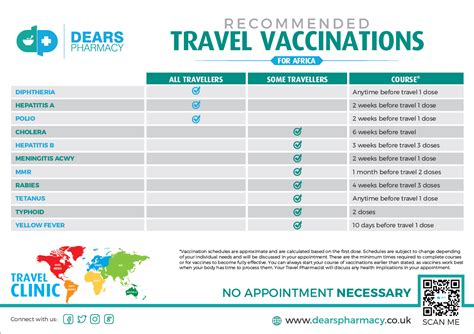5 Travel Vaccine Tips

Introduction to Travel Vaccines
Traveling to a new destination can be an exciting experience, but it also comes with health risks. Depending on where you’re traveling to, you may be exposed to diseases that are uncommon in your home country. This is where travel vaccines come in – to protect you against serious diseases and ensure a safe and healthy trip. In this article, we’ll explore five essential travel vaccine tips to consider before your next adventure.
Understanding Travel Vaccines
Travel vaccines are designed to prevent diseases that are prevalent in specific regions or countries. These vaccines can be categorized into two main types: routine vaccines and recommended vaccines. Routine vaccines are those that are typically administered during childhood, such as measles, mumps, and rubella (MMR) vaccine, while recommended vaccines are those that are specifically required for travel to certain areas, such as the yellow fever vaccine. It’s crucial to consult with a healthcare professional to determine which vaccines you need based on your travel plans.
Tip 1: Research Your Destination
Before traveling, research your destination to determine which vaccines are required or recommended. You can visit the Centers for Disease Control and Prevention (CDC) website or consult with a travel clinic to get information on the necessary vaccines for your destination. Some countries require proof of vaccination before entry, so it’s essential to stay informed. Make a list of the vaccines you need, and schedule an appointment with your healthcare provider or a travel clinic to get vaccinated.
Tip 2: Get Vaccinated in Advance
Some travel vaccines require multiple doses, and it’s essential to get vaccinated in advance to ensure you’re fully protected. The recommended timeframe for vaccination varies depending on the vaccine, but it’s generally recommended to get vaccinated at least 4-6 weeks before travel. This allows time for the vaccine to take effect and provides optimal protection against diseases.
Tip 3: Consider Your Health Status
Certain health conditions, such as pregnancy or immune system disorders, may affect the type of vaccines you can receive. It’s essential to inform your healthcare provider about any health conditions or medications you’re taking, as this may impact the type of vaccines you’re eligible for. Additionally, some vaccines may not be suitable for people with certain medical conditions, so it’s crucial to discuss your health status with a healthcare professional.
Tip 4: Stay Up-to-Date on Booster Shots
Booster shots are essential to maintain immunity against certain diseases. Tetanus and diphtheria booster shots, for example, are recommended every 10 years. If you’re traveling to an area where these diseases are prevalent, it’s essential to ensure your booster shots are up-to-date. Consult with your healthcare provider to determine which booster shots you need and when you should receive them.
Tip 5: Keep a Record of Your Vaccinations
Keeping a record of your vaccinations is crucial, especially when traveling. You may need to provide proof of vaccination when entering certain countries or attending events. Make sure to keep a record of your vaccinations, including the date, time, and type of vaccine received. You can use a vaccination record card or a digital app to keep track of your vaccinations.
| Vaccine | Description | Recommended for |
|---|---|---|
| Yellow Fever Vaccine | Protects against yellow fever virus | Travel to sub-Saharan Africa and South America |
| Hepatitis A Vaccine | Protects against hepatitis A virus | Travel to areas with high risk of hepatitis A |
| Typhoid Vaccine | Protects against typhoid fever | Travel to areas with high risk of typhoid fever |
🚨 Note: Always consult with a healthcare professional before receiving any vaccine, as they can provide personalized advice based on your health status and travel plans.
In summary, travel vaccines are a crucial aspect of preparing for a trip, and by following these five tips, you can ensure a safe and healthy journey. Remember to research your destination, get vaccinated in advance, consider your health status, stay up-to-date on booster shots, and keep a record of your vaccinations. By taking these steps, you can enjoy your travels while minimizing the risk of contracting serious diseases.
What is the most important travel vaccine to get?
+
The most important travel vaccine to get depends on your destination and health status. However, the yellow fever vaccine is often considered one of the most critical vaccines for travelers, as it protects against a potentially life-threatening disease.
How long do travel vaccines last?
+
The duration of travel vaccines varies depending on the vaccine and individual factors, such as age and health status. Some vaccines, like the yellow fever vaccine, provide lifelong protection, while others may require booster shots every 10-20 years.
Can I get travel vaccines at a pharmacy?
+
Some pharmacies offer travel vaccines, but it’s essential to consult with a healthcare professional before receiving any vaccine. They can provide personalized advice and ensure you receive the necessary vaccines for your destination.